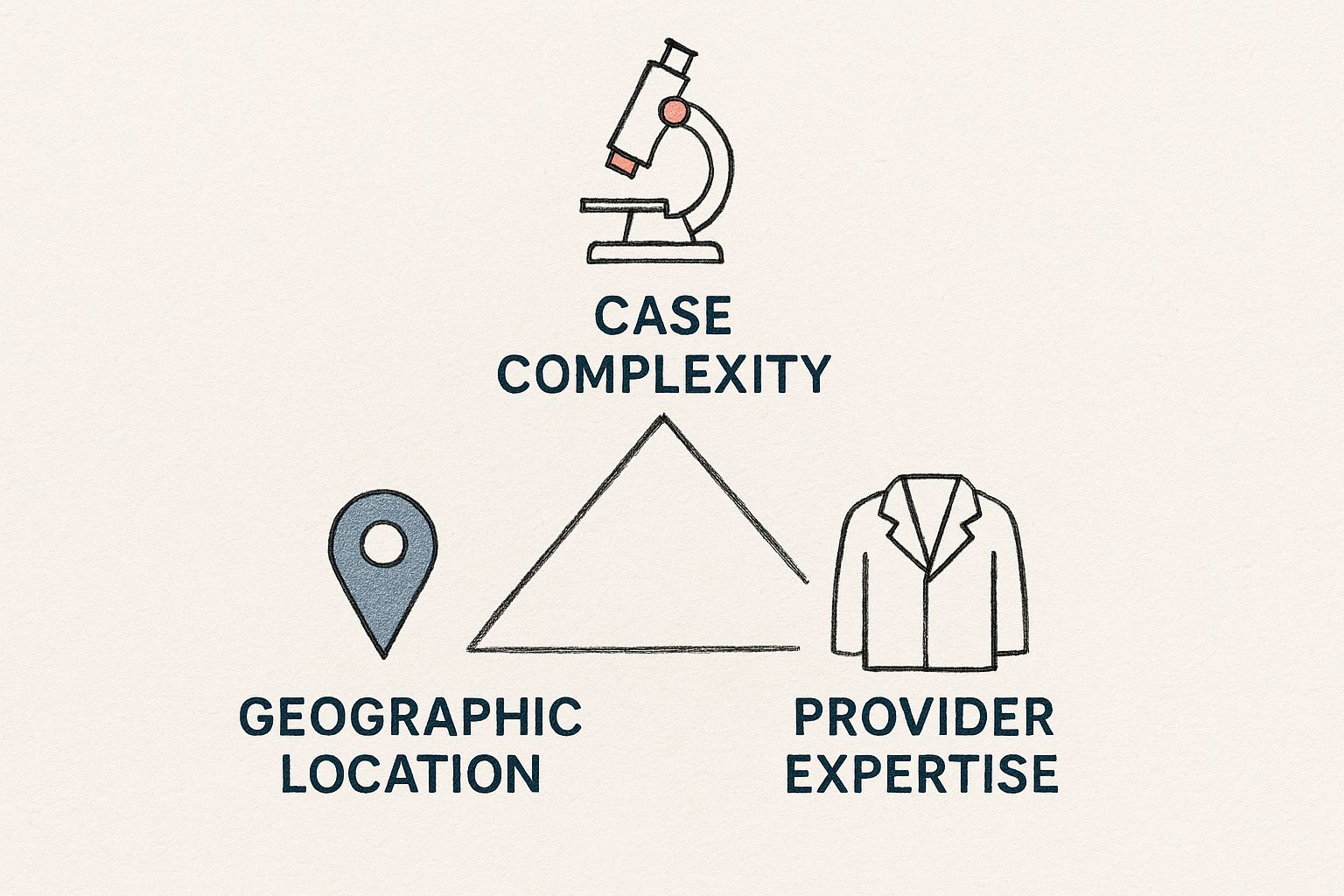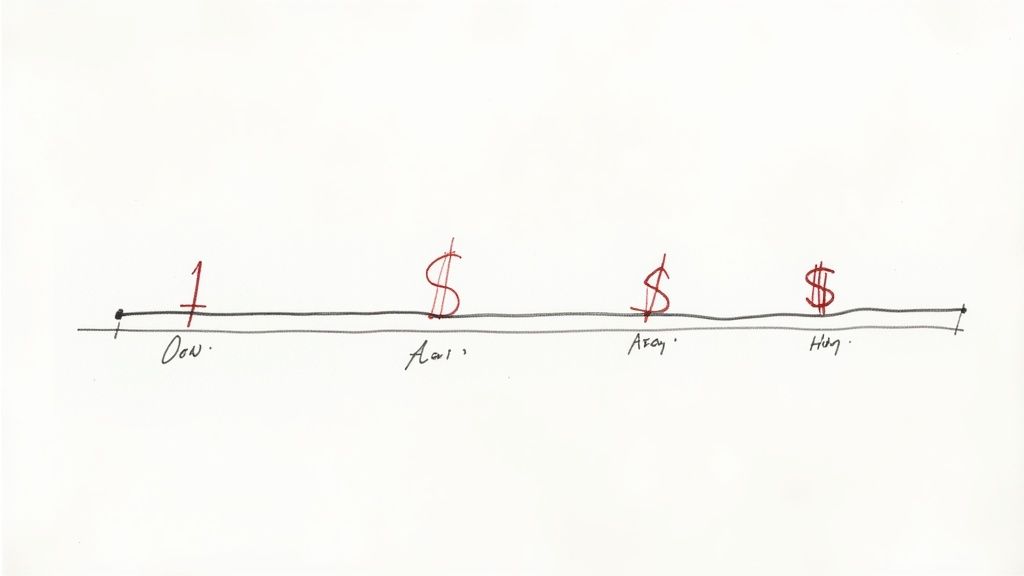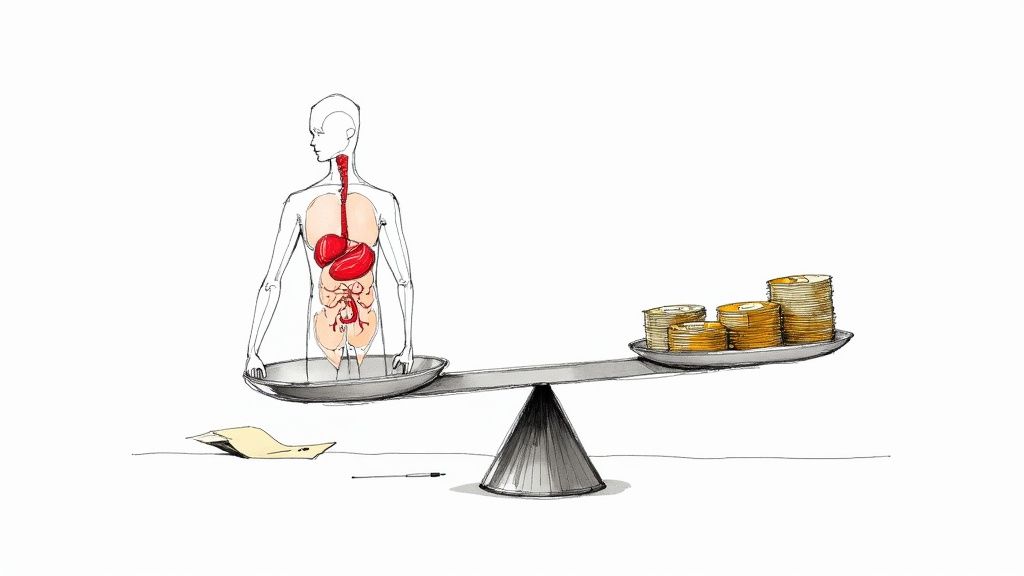When a loved one passes away, the search for answers can be an overwhelming part of an already difficult time. A private autopsy offers a path to clarity, but for many families, one of the first and most practical questions is about the expense. The cost of a private autopsy is a primary concern, and you deserve clear, upfront information.
My goal is to provide a transparent overview of the costs involved, so you can make an informed decision with confidence and peace of mind.
- TL;DR: The cost of a private autopsy in the United States typically ranges from $3,000 to $7,000. This fee covers the core examination by a board-certified pathologist and a comprehensive final report.
- The final price is influenced by case complexity, the scope of the examination (e.g., full-body vs. limited), and transportation logistics.
- Specialized tests, such as toxicology, neuropathology, or genetic analysis, are not included in the standard fee and will add to the total cost.
- Private autopsies are almost never covered by insurance, as they are considered an elective service requested by the family.
Understanding the Cost of a Private Autopsy
Navigating the loss of a family member is an incredibly challenging process, and unexpected financial burdens only compound the stress. In my practice, I believe in complete transparency regarding the costs of a private autopsy. This allows families to make decisions based on clear information, without the worry of hidden fees.
The baseline cost reflects a highly specialized medical procedure. It is an investment in the expertise of a board-certified forensic pathologist, the use of a dedicated facility, and the meticulous, detailed work required to provide definitive answers about a cause of death. Think of this cost as the foundation for a thorough, compassionate, and conclusive investigation.
Like any complex medical service, the final fee depends on the specific requirements of each individual case.
Private Autopsy Cost at a Glance
To provide a clearer picture, this table outlines what is generally included in a standard private autopsy package.
| Service Level | Typical Cost Range (USD) | Core Services Included |
|---|---|---|
| Standard | $3,000 - $7,000 | • Full external and internal examination by a board-certified pathologist. • Collection of tissue and fluid samples. • Basic microscopic tissue analysis (histology). • A comprehensive final report detailing all findings. |
This table represents the core services. However, it's important to remember that the final cost will be tailored to the unique circumstances of your case.
Why Is There a Price Range?
You may wonder why a single flat fee isn't standard. The reason is that an autopsy is not a one-size-fits-all procedure. The variation in cost directly reflects several key factors that are present from the outset of any case.
- Scope of the Examination: A complete, full-body examination is more comprehensive and resource-intensive than a limited examination focused on a specific organ system, such as the brain or heart.
- Case Complexity: A case involving a straightforward medical history is less complex than one with extensive prior surgeries, multiple chronic illnesses, or other complicating factors that require more in-depth investigation.
- Logistical Needs: The location of the deceased and the need for transportation to a suitable examination facility also play a significant role in the overall cost structure.
For those interested in the broader financial aspects of healthcare, understanding how a medical practice valuation is determined can offer context into the operational costs that influence pricing for specialized medical services like these.
In the following sections, I will delve deeper into each of these cost factors, explaining precisely what is included in a standard fee and what other costs may arise for more specialized analyses.
What Factors Influence the Final Autopsy Cost?
When determining the cost of a private autopsy, there is no single, fixed price. The final fee is a composite of several factors, each tied directly to the specifics of the case. Understanding these variables will give you a much clearer picture of the investment required to obtain the answers you need.
The most significant factor is the scope of the examination itself. A complete, full-body autopsy is inherently more involved—and therefore more expensive—than a limited one that focuses on a specific area, such as the brain (neuropathology) or the cardiovascular system.
The complexity of the individual's medical history also plays a crucial role. If the deceased had a long history of chronic illness, multiple surgeries, or organ transplants, the examination requires a more extensive and time-consuming investigation to accurately interpret the findings.
This infographic provides a visual breakdown of how these elements combine to determine the final cost.

As illustrated, the case's complexity, geographic location, and the specific expertise of the pathologist are interconnected and contribute to the final price.
Ancillary Services and Specialized Testing
The standard autopsy serves as the core investigation. However, to uncover the complete picture, specialized tests may be necessary. These "ancillary services" are not part of the standard fee and will add to the total cost. The most common of these is toxicology testing, which screens for drugs (both prescription and illicit), alcohol, and other substances.
Other specialized tests may be required, depending on the circumstances of the case:
- Histology: This is the microscopic examination of tissue samples. It is essential for identifying diseases at a cellular level, such as cancer or subtle organ damage.
- Neuropathology: If there is a suspicion of dementia, Alzheimer's disease, or a traumatic brain injury, a specialist must examine the brain and nervous system.
- Microbiology: When an infection may have contributed to the death, cultures are grown to identify the specific bacteria, virus, or fungus responsible.
Each of these tests requires specialized laboratory equipment and highly trained experts for interpretation, which is why they carry additional costs.
Logistical and Geographic Considerations
Finally, practical logistics will influence the price. The most significant is typically transportation—the respectful conveyance of the deceased to the facility where the autopsy will be performed. The distance involved will affect this cost.
It is also worth noting that costs vary geographically. A 2022 study highlighted how prices can differ significantly from one country to another, based on local regulations and whether the autopsy is for clinical or forensic purposes. You can read the full research about international autopsy costs to understand the global context.
Ultimately, the most effective way to understand the full financial scope is to have a direct and open conversation with the pathology provider. They can provide a clear, itemized breakdown based on your family's specific needs.
So, What's Usually Included in the Fee?
When you receive a cost estimate for a private autopsy, it is vital to understand exactly what that fee covers. This is not a single procedure but a comprehensive process designed to provide your family with clear, definitive answers during a profoundly difficult time. My commitment is to complete transparency, ensuring you know what every dollar covers from the beginning.

The standard fee should be viewed as an all-inclusive professional service. This approach bundles all essential components to prevent unexpected charges and ensure every necessary step is taken without hidden costs arising later.
Breaking Down the Standard Fee
At the core of the cost is my professional service as a triple board-certified forensic pathologist. This fee encompasses the years of specialized training, education, and experience required to conduct a detailed examination and accurately interpret the findings. Beyond my direct involvement, the fee also includes:
- Facility and Staffing: This covers the use of a proper, specialized mortuary designed for these examinations, as well as the assistance of a trained autopsy technician who supports me throughout the procedure.
- The Complete Examination: This is the heart of the work—a meticulous external and internal examination of the deceased.
- Specimen Collection: I carefully collect and preserve tissue and fluid samples. These are crucial for microscopic analysis and can be retained for potential future testing if needed.
- Comprehensive Final Report: This is not a brief summary. I author a detailed, multi-page report that outlines every procedure, all findings, and microscopic descriptions, culminating in a clear, medically sound cause of death determination.
This final report is the ultimate deliverable. It is more than a document; it is a legal and medical record that provides the solid answers your family is seeking. I write it to be understood by everyone, not just medical professionals, while adhering to the precise standards required for any legal or insurance matters.
The evolution of these costs is noteworthy. In the early 1990s, historical data indicate the average autopsy fee was approximately $518. This was, of course, a different era in both economics and healthcare. Even then, hospital-based autopsies were declining, partly because they were seen as an expense rarely covered by insurance—a challenge that families seeking private autopsies continue to face today.
The methodical approach is similar to that described in our guide on what a forensic autopsy is, though the legal context differs. Ultimately, the standard fee is structured to provide a complete, compassionate, and conclusive service, from the initial consultation to the delivery of the final report.
What About Additional Costs for Specialized Testing?
A standard autopsy provides a vast amount of information, but some circumstances require a deeper investigation to reveal the full story. If a standard examination creates a detailed map of the body, these ancillary tests are the specialized tools—a magnifying glass or a chemical analysis kit—used to investigate specific points of interest on that map.
These tests are not included in the base price because they involve different equipment, external expert consultants, and separate laboratory processes. It is crucial to understand these potential add-ons to form a realistic picture of the total investment.
Common Types of Ancillary Tests
The specific tests needed depend entirely on the questions we are trying to answer. For instance, if the deceased had a complex history with prescription medications, a toxicology screen is a logical next step. If they were experiencing cognitive decline, a specialized brain examination is likely warranted.
Here are the most common services that may supplement a standard autopsy:
- Toxicology: This is the most frequent ancillary test. A toxicology screen analyzes blood, urine, and tissue for prescription medications, illegal drugs, alcohol, and other chemicals. It is vital in any case where a drug overdose, poisoning, or adverse medication reaction is suspected. For a closer look at this process, please see our guide on the toxicology report after death.
- Histology: This is the microscopic study of tissue samples. While a few basic slides are often included in a standard autopsy, extensive histology is a more involved process. It may require preparing dozens of slides to identify subtle clues—like early-stage cancer or microscopic tissue damage—that are invisible to the naked eye.
- Neuropathology: When there is a concern about conditions such as Alzheimer's disease, Parkinson's, or chronic traumatic encephalopathy (CTE), a neuropathologist must perform a highly specialized examination of the brain and spinal cord. This is a much more focused and intensive procedure than a standard brain inspection.
Other Specialized Analyses You Might Encounter
Depending on the circumstances, other tests may be recommended. Microbiology cultures can identify the precise bacteria or virus responsible for a fatal infection. In very specific cases, such as a sudden unexplained death in a young, otherwise healthy individual, genetic testing might be considered. This can uncover hereditary conditions, providing potentially life-saving information for surviving family members.
Each of these specialized tests adds another layer of scientific investigation. I only recommend them when I believe they are essential to determining the most accurate cause of death. The goal is to leave no stone unturned in finding the answers your family deserves.
To help you plan, here is a general breakdown of what these services are for and their typical costs.
Cost Estimates for Common Ancillary Autopsy Services
| Specialized Test | Purpose of Test | Estimated Additional Cost (USD) |
|---|---|---|
| Comprehensive Toxicology | Screens for a wide range of prescription drugs, illicit substances, and alcohol. | $800 - $1,500 |
| Extensive Histology | Microscopic examination of numerous tissue samples to identify disease. | $500 - $1,200 |
| Neuropathology Examination | Specialized brain analysis to diagnose conditions like Alzheimer's or CTE. | $1,500 - $3,000+ |
| Microbiology Cultures | Identifies specific infectious agents like bacteria or fungi. | $300 - $700 |
| Genetic Testing | Looks for inherited conditions that may have caused a sudden death. | $2,000 - $5,000+ |
This table provides a general estimate of the investment required for these more in-depth analyses. The final cost can vary based on the complexity of the case and the specific laboratory performing the tests.
Why a Private Autopsy Is an Investment in Answers

It is easy to focus on the price tag, but viewing a private autopsy as a mere expense misses its fundamental purpose. It is better understood as an investment—an investment in truth, in closure, and in the peace of mind that your family deserves.
When a death is sudden or the cause is uncertain, a storm of questions can arise. A forensic examination cuts through that uncertainty, replacing speculation and doubt with scientific fact. For many families, that clarity is the first essential step toward healing.
The Value Beyond the Cost
The insights gained from a private examination often extend far beyond determining the immediate cause of death. The findings can have tangible, lasting impacts on a family’s health, their legal standing, and their emotional recovery.
- Protecting Future Generations: An autopsy might uncover a hereditary condition, such as a specific heart ailment or a genetic disorder. This discovery provides surviving family members with life-saving information, empowering them to take proactive steps in managing their own health.
- Providing Legal Clarity: In situations involving potential medical malpractice, workplace incidents, or other legal disputes, the autopsy report serves as impartial, scientific evidence. It establishes a solid foundation of fact for any legal action, ensuring the outcome is based on medical truth rather than conjecture.
- Dispelling Uncertainty: Grief is difficult enough without being haunted by "what-if" scenarios. A detailed examination delivers concrete answers, helping families move forward with a clear understanding of what occurred.
A Foundation for Justice
Often, the answers families seek are necessary for legal purposes. The forensic evidence gathered can be absolutely crucial for navigating the legal implications of serious crimes and ensuring accountability.
An autopsy report is more than a medical document; it is a testament to the truth. It offers an unbiased, detailed account that can bring resolution to even the most complex and painful situations, giving families the answers they deserve.
Ultimately, the choice to pursue a private autopsy is a decision to seek the truth, whatever it may be. The cost reflects the detailed, expert work required to uncover that truth, making it a priceless investment for any family left searching for answers.
The Hidden Costs of Not Performing an Autopsy
When asking, "how much does a private autopsy cost?" it is equally important to consider the potential costs of not performing one. The decision to forgo an autopsy when questions remain can create a new set of challenges, some with consequences that can last for years.
The most immediate cost is emotional. Unanswered questions about a loved one's final days can linger, making the grieving process incredibly difficult. Families can become trapped in a painful cycle of "what ifs," second-guessing every detail. Without a clear, definitive cause of death, achieving true closure can feel impossible. That uncertainty is a heavy burden to carry.
Practical and Legal Consequences
Beyond the emotional toll, there are tangible, practical consequences. An autopsy can reveal genetic or hereditary conditions, like specific heart diseases or cancers, that may pose a risk to living family members. Skipping the autopsy means missing a critical opportunity for a family to gain foresight into potential health issues.
From a legal perspective, the absence of a conclusive, expert-documented cause of death can be a significant setback. It can seriously weaken—or even entirely undermine—a valid claim related to:
- Medical Negligence: Proving a medical error led to a death is nearly impossible without the hard scientific evidence that an autopsy provides.
- Workplace Incidents: Forensic proof is necessary to connect a death to factors like toxic exposure or unsafe working conditions.
- Accidents and Liability: A detailed report clarifies the exact nature of injuries, which is vital for insurance claims or personal injury lawsuits.
The upfront cost of a private autopsy can be a significant consideration, but it is often a preventative investment. It provides the concrete answers needed to avoid far greater emotional, medical, and financial burdens down the road.
The value of autopsies is consistently recognized through ongoing investment in modern forensic science. The global market for essential equipment like autopsy tables is projected to grow by 6.2% annually, reaching nearly $58 million by 2027. You can discover more insights about this growing industry and its impact on forensics. This growth underscores how critical the procedure remains in both medicine and law.
Frequently Asked Questions About Autopsy Costs
Losing a loved one is an incredibly difficult experience, and it is completely normal to have many questions. My goal here is to provide clear, straightforward answers about the financial aspects of considering a private autopsy.
Having direct information can make a challenging time feel more manageable. Let's address some of the most common questions families ask.
Is a Private Autopsy Covered by Insurance?
This is often the first question on a family's mind. In nearly all cases, private autopsies are not covered by health insurance, Medicare, or Medicaid. The reason is that the procedure is requested directly by the family and is therefore considered elective, not a medical necessity determined by a hospital or government official.
Because of this, the cost is an out-of-pocket expense for the family. While it is always wise to check with your specific insurance provider, coverage for a private autopsy is exceptionally rare.
Are There Payment Plans or Financing Options Available?
This depends on the individual pathology practice. Some providers may offer payment plans or be able to direct you to third-party financing companies that specialize in medical-related expenses.
It is crucial to discuss payment options directly with the pathologist's office before agreeing to any services. The nature of this work means that many providers, including my own practice, require payment in full before the examination can begin. This ensures that the facility, technicians, and any specialized testing are secured and ready without delay.
Why Is a Private Autopsy More Expensive Than a Hospital or Medical Examiner Autopsy?
This question gets to the core of what you are paying for. When a hospital or medical examiner performs an autopsy, the cost is covered by that institution or by public funds from the county or state. The family does not receive a bill because taxpayers or the hospital's budget covers the expense.
A private autopsy is a dedicated professional service, much like hiring a private attorney or a specialist medical consultant for their focused expertise.
The fee for a private autopsy covers the pathologist's specialized training and experience, the use of a proper facility, technician support, all necessary equipment, and—most importantly—the creation of a comprehensive legal report dedicated exclusively to answering your family's questions.
The entire service is centered on your specific case, delivering a level of detail and personal attention that institutional autopsies, due to their high volume and different purpose, often cannot provide. For families also wondering about the timeline, you can learn more by reading our detailed guide on how long it takes to get autopsy results. Understanding both the financial and time commitments can help you make a fully informed decision.
If you have more questions or need to discuss your family's situation, my team and I are here to help with compassion and clarity. Please do not hesitate to contact our office by phone or email for a confidential consultation. https://www.texasautopsyservices.com

